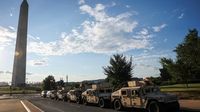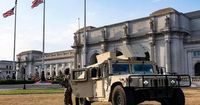National Guard troops from six Republican-led states are now on the ground in Washington, D.C., as President Donald Trump’s administration ramps up efforts to address what it calls a surge in crime in the nation’s capital. The deployment, announced in a series of statements and press conferences over the past two weeks, marks one of the most significant multi-state military responses to a domestic policing issue in recent memory.
On August 19, 2025, Tennessee became the latest state to pledge support, announcing it would send 160 National Guard soldiers to Washington, D.C. According to CBS News, this move brings the total number of Republican-led states committing troops to six: Ohio, West Virginia, South Carolina, Louisiana, Mississippi, and Tennessee. The combined deployment is substantial. Fox News reported that more than 2,000 National Guard troops are slated to participate in the Trump administration’s crackdown, with roughly 1,300 already having arrived in Washington by August 19.
The effort is a response to President Trump’s August 6 announcement, in which he floated plans to deploy National Guard troops and federalize the Metropolitan Police Department (MPD) in D.C. The catalyst, Trump said, was the assault of a former Department of Government Efficiency staffer, an incident that quickly became a flashpoint in the administration’s calls for greater law and order. Days later, Trump announced the activation of approximately 800 National Guard troops and the temporary federal takeover of the MPD to address crime in the city.
“I’m deploying the National Guard to help reestablish law, order and public safety in Washington, D.C.,” Trump told reporters at an August 11 press conference. “And they’re going to be allowed to do their job properly.”
Each state’s contribution is significant in its own right. Mississippi has pledged 200 troops, Tennessee 160, Louisiana 135, South Carolina 200, and Ohio 150. West Virginia, for its part, has already dispatched approximately 500 National Guard soldiers, who, as of August 19, were being briefed on their mission in the capital. A U.S. Army official told Fox News that once training concludes, these troops will join the D.C. National Guard in “supporting the mission as it currently exists.”
Ohio’s Governor Mike DeWine, a Republican, explained the rationale behind his state’s involvement: “We have been asked by the Secretary of the Army to send 150 military police from the Ohio National Guard to support the District of Columbia National Guard,” DeWine said on August 16. “These Ohio National Guard members will carry out presence patrols and serve as added security. None of these military police members are currently serving as law enforcement officers in the state of Ohio.”
The White House has framed the deployments as a necessary step to protect federal assets, provide a “safe environment” for law enforcement officials, and create a visible presence to deter crime. In a statement to Fox News Digital, a White House official said, “President Trump appreciates and welcomes additional assistance from local and state officials that want to join the operation to protect our cherished capital from dangerous criminals. As part of President Trump’s ongoing effort to make DC safe and beautiful, additional National Guard troops may be called in to Washington, D.C. — the National Guard’s role has not changed.”
Despite these assurances, the move has sparked significant controversy and legal challenges within the District. On August 15, Washington, D.C., officials filed a lawsuit challenging the federal takeover of the Metropolitan Police Department. D.C. Attorney General Brian Schwalb was blunt in his assessment, writing on X (formerly Twitter), “By illegally declaring a takeover of MPD, the Administration is abusing its temporary, limited authority under the law. This is the gravest threat to Home Rule DC has ever faced, and we are fighting to stop it.”
Mayor Muriel Bowser, meanwhile, has questioned the administration’s motives, suggesting that the deployment is less about curbing crime and more about advancing a broader immigration enforcement agenda. “I think it makes the point that this is not about D.C. crime,” Bowser said on August 17. “The focus should be on violent crime. ... Nobody is against focusing on driving down any level of violence. And so, if this is really about immigration enforcement, the administration should make that plain.”
On the ground, the presence of National Guard troops is unmistakable. According to Fox News Digital, dozens of soldiers have been stationed outside key federal buildings and landmarks, including Union Station, where they are visible to commuters and protesters alike. The sight of military personnel patrolling the city’s streets has drawn both praise and criticism, depending on whom you ask.
For supporters of the move, the deployment represents a much-needed intervention in a city they say is struggling to contain a surge in violent crime. They argue that the federal government has both the right and the responsibility to protect the nation’s capital, especially when local resources are stretched thin. “These are extraordinary times that call for extraordinary measures,” one administration official told Fox News, emphasizing the need for a robust response to rising crime rates.
Critics, however, warn that the federal takeover and the influx of out-of-state troops threaten the city’s autonomy and set a dangerous precedent. D.C. residents and local officials have long fought for greater control over their own affairs, and many see the Trump administration’s actions as a direct assault on that principle. The lawsuit filed by city officials is just the latest chapter in a decades-long struggle for “Home Rule” in the District.
The Pentagon, for its part, has remained largely silent on the specifics of why National Guard troops from other states are joining the D.C. National Guard, declining to comment to Fox News Digital. This silence has only fueled speculation and debate over the true intent and long-term implications of the deployment.
As the situation continues to unfold, one thing is clear: the deployment of more than 2,000 National Guard troops to Washington, D.C., is a dramatic and controversial escalation in the ongoing debate over crime, policing, and federal authority in the nation’s capital. With lawsuits pending and political tensions running high, the coming weeks are likely to see further developments—and, perhaps, even more troops on the city’s streets.
For now, the capital remains under the watchful eyes of soldiers from across the country, as residents, lawmakers, and the nation at large grapple with the consequences of this unprecedented intervention.


